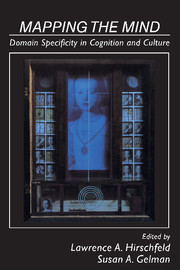Book contents
- Frontmatter
- Contents
- List of contributors
- Preface
- Part I Overview
- Part II The origins of domain knowledge: Biology and evolution
- Part III The origins of domain knowledge: Conceptual approaches
- 5 ToMM, ToBY, and Agency: Core architecture and domain specificity
- 6 Moral belief: Form versus content
- 7 Domain-specific knowledge and conceptual change
- 8 Is the acquisition of social categories based on domain-specific competence or on knowledge transfer?
- 9 The birth and nurturance of concepts by domains: The origins of concepts of living things
- Part IV Are domains theories?
- Part V Domains across cultures and languages
- Part VI Implications for education
- Author index
- Subject index
7 - Domain-specific knowledge and conceptual change
Published online by Cambridge University Press: 04 August 2010
- Frontmatter
- Contents
- List of contributors
- Preface
- Part I Overview
- Part II The origins of domain knowledge: Biology and evolution
- Part III The origins of domain knowledge: Conceptual approaches
- 5 ToMM, ToBY, and Agency: Core architecture and domain specificity
- 6 Moral belief: Form versus content
- 7 Domain-specific knowledge and conceptual change
- 8 Is the acquisition of social categories based on domain-specific competence or on knowledge transfer?
- 9 The birth and nurturance of concepts by domains: The origins of concepts of living things
- Part IV Are domains theories?
- Part V Domains across cultures and languages
- Part VI Implications for education
- Author index
- Subject index
Summary
Overview
We argue that human reasoning is guided by a collection of innate domain-specific systems of knowledge. Each system is characterized by a set of core principles that define the entities covered by the domain and support reasoning about those entities. Learning, on this view, consists of an enrichment of the core principles, plus their entrenchment, along with the entrenchment of the ontology they determine. In these domains, then, we would expect cross-cultural universality: cognitive universals akin to language universals.
However, there is one crucial disanalogy to language. The history of science and mathematics demonstrates that conceptual change in cognitive domains is both possible and actual. Conceptual change involves overriding core principles, creating new principles, and creating new ontological types. We sketch one potential mechanism underlying conceptual change and motivate a central empirical problem for cognitive anthropology: To what extent is there cross-cultural universality in the domains covered by innate systems of knowledge?
Domain-specific cognition
The notion of domain-specific cognition to be pursued here is articulated most clearly by Chomsky (1980a). Humans are endowed with domainspecific systems of knowledge such as knowledge of language, knowledge of physical objects, and knowledge of number. Each system of knowledge applies to a distinct set of entities and phenomena. For example, knowledge of language applies to sentences and their constituents; knowledge of physical objects applies to macroscopic material bodies and their behavior; knowledge of number applies to sets and to mathematical operations such as addition. More deeply, each system of knowledge is organized around a distinct body of core principles.
- Type
- Chapter
- Information
- Mapping the MindDomain Specificity in Cognition and Culture, pp. 169 - 200Publisher: Cambridge University PressPrint publication year: 1994
- 236
- Cited by



